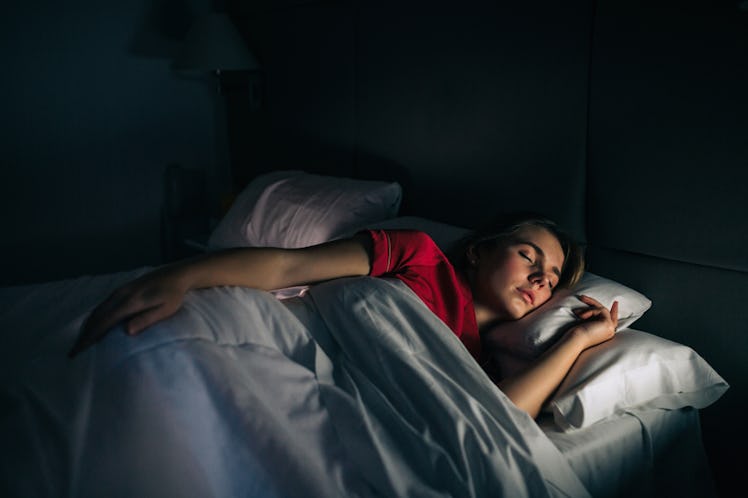
The 5 Most Important Red Flags To Watch Out For When It Comes To Your Sleep Schedule
Sleep isn't always the easiest aspect of your life, even if it's technically something you do while you're unconscious. In fact, it can be even more difficult to have a handle on your sleep schedule than other parts of your life, simply because you don't necessarily know what's going on. The best way to stay on top of your sleep health is to watch out for the sleep red flags that may mean you're not getting good enough, or even long enough, sleep.
Even though you may not ever really take the time to consciously think about things like this, your sleep cycle is far more complex than an on/off button for your body: There are multiple stages of your REM (rapid eye movement) cycle, from the lightest stage of sleep to the deepest stage, each of which has a different purpose and intensity, the deepest stages being the most important for your rest and overall health, as well as the worst ones to wake up in the middle of.
The typical adult needs about eight hours of sleep each night in order to feel well-rested the next day. Consider this your barometer for sleep, especially if you think you're not getting enough.
Sleep might seem like a complex beast to master, but it's more about knowing what the signs of fatigue are, and how to fix them. Here are five quick red flags to look out for, and how to tackle them.
01You Keep Pressing Snooze Every Morning
If you keep pressing snooze every single morning, you might need to go to sleep earlier, or you may need to tailor your sleep schedule around your REM cycle in a more intentional way. One easy sleep hack is to set your alarm based off of a 90-minute increment of time from the moment you go to sleep.
Since your REM cycle is around 90 minutes long, according to the American Sleep Association, timing your sleep schedule around those chunks of time will help you avoid waking up groggy as hell in the deepest part of your sleep stage. For example, if you go to sleep at 10:30 p.m., you could set your alarm for 6 a.m. rather than 6:30 a.m., since that will wake you up at the end of your cycle rather than in the middle.
02You Always Wake Up Tired, No Matter How Much You Sleep
If you're constantly exhausted, no matter how many hours of sleep you're getting, it might be time to think about your physical health. Oversleeping is often an indicator that your body is worn down, or it may even indicate that your immune system is fighting off an illness.
When you're getting a consistent eight or more hours of sleep every night, and it still isn't enough, then it's likely time to talk to your doctor about it. There's a chance your sleep cycle isn't reaching the deep-sleep, REM stage, or there could be another underlying health condition preventing you from feeling well-rested.
03You Rely On Coffee To Get Through The Day
From one coffee fanatic to another, there is absolutely nothing wrong with a cup (or two, or four...) during the day to keep your spirits up and your mind sharp. Coffee is good for your heart health, according to Everyday Health, which is a point that I would personally like to remind the haters of when they're eyeing my third cold brew of the day.
However, when you're starting to rely on coffee or other caffeinated beverages just to stay awake, there's a problem. Ask yourself if you'd be able to go through the day without coffee. If you can't, it's probably time to pay more attention to your sleep cycle. Take the time to try to narrow down the problem. If the issue is that you have trouble staying asleep, try improving the sleep environment of your room.
04You Need Multiple Cat Naps A Day To Keep Your Energy Up
If you're taking multiple cat naps throughout the day, then your current sleep schedule likely isn't doing it for you. Getting a good night of sleep, for most people, means that you shouldn't ever feel like you have to nap during the day.
Although it's totally normal to want a snooze in the early afternoon, wanting to sleep all day long is a sign you're not getting enough sleep at night. Try cutting off caffeine by the afternoon, so that your body is ready for sleep come nighttime.
05You Wake Up With A Sore Throat, Dry Mouth, Or Headache
According to Prevention, if you're constantly waking up with a sore throat, dry mouth, or headache, it may be a sign you're a chronic snorer, or you might have sleep apnea, a condition that causes you to stop breathing while you're asleep, and wake yourself up as a result.
One way to approach these problems is to change your sleep position so that you're sleeping on your side. Sleeping on your back encourages snoring and sleep apnea, Greatist reports, while sleeping on your side can help prevent it.
Happy snoozing, y'all!